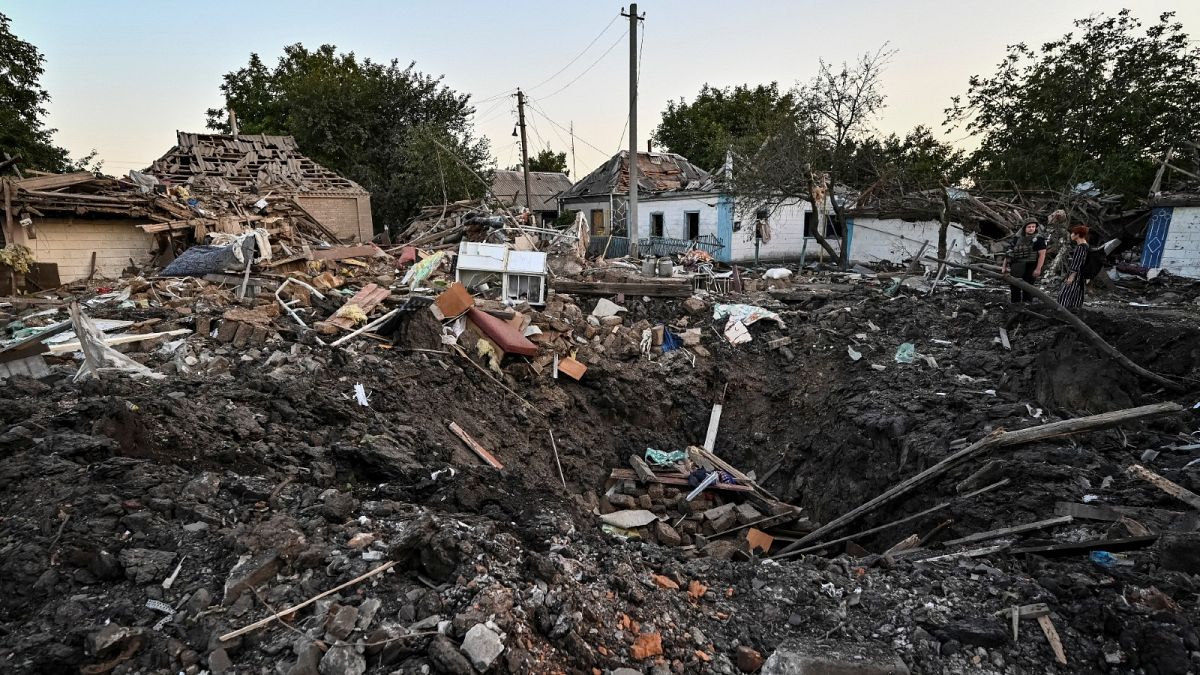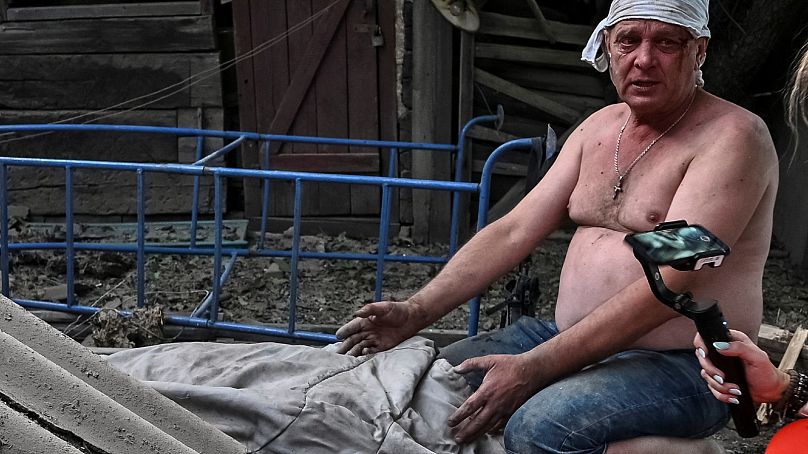It includes criticism of Russia over a strike in Chaplyne that left 25 people dead.
1. Zelenskyy, EU and US vow to hold Russia to account for Chaplyne train attack
The EU and the US have joined President Volodymyr Zelenskyy in vowing to hold Russia responsible after a rocket attack on a train station on Ukraine's independence day killed over two dozen people and wounded even more.
Ukraine's train operator confirmed on Thursday that the number of confirmed dead had risen to 25, with another 31 injured, following the attack at Chaplyne in central Ukraine.
Ukrainian officials said two missiles had struck the small town, 120 kilometres southeast of Dnipro. One hit a residential area while another set on fire a passenger train at the railway station.
The victims included an 11-year-old boy found under the rubble of a house, and a 6-year-old killed in a car fire near the station, one said.
As rescue operations ended, the elder boy's father Serhiy was among local residents grieving for their loved ones amid their wrecked homes.
"We looked for him there in the ruins, and he was lying here. Nobody knew that he was here. Nobody knew," he said as he crouched next to his son's covered body.
Dnipropetrovsk health chief Tetyana Kvitnytska said the wounded suffered a range of injuries, and were suffering "both physically and psychologically". They included four children, three of whom were in a serious condition.
The European Union's chief diplomat Josep Borrell condemned the attack on civilians. "Those responsible for Russian rocket terror will be held accountable," he tweeted on Thursday.
"Russia’s missile strike on a train station full of civilians in Ukraine fits a pattern of atrocities," US Secretary of State Antony Blinken tweeted, also pledging to "seek accountability for Russian officials".
Russia admitted carrying out the attack but claimed on Thursday that its missile had killed hundreds of Ukrainian military servicemen.
An Iskander missile "directly hit a military train at the Chaplyne station in the Dnipropetrovsk region, killing more than 200 servicemen of the Ukrainian Armed Forces reserve" as well as equipment, the Russian defence ministry said in a statement.
According to the Russian ministry, the train was "on its way to the combat zones" in eastern Ukraine.
The Ukrainian Prosecutor General's Office said on Thursday that 10 civilians had been killed and another 10 injured at Chaplyne. There was no word on the identity of the remaining casualties quoted by other officials, and Ukraine has made no mention of military casualties.
"Chaplyne is our pain today," Zelenskyy said in his nightly video address to the nation. Ukraine's independence would "never end", he added.
"We will definitely make the occupiers bear responsibility for everything they have done. And we will certainly drive the invaders out of our land. Not a single stain of this evil will remain in our free Ukraine. We will make our way to victory. It will happen!"
2. Putin calls for more troops amid Ukraine losses
Russian President Vladimir Putin ordered a major buildup of his country's military forces on Thursday in an apparent effort to replenish troop losses, following six months of bloody warfare in Ukraine.
The move will boost troop numbers by 137,000 to 1.15 million by the end of the year, equivalent to a 13% increase.
Putin’s order did not specify how the expansion would be accomplished. It could happen by widening the draft, recruiting more volunteers or a combination of both.
However, some Russian military analysts have predicted that the country will need to rely more on volunteers over fears of a potential domestic backlash if more citizens are drafted into the conflict.
Russia's armed forces will total more than 2 million, including the 1.15 million troops, should the planned expansion succeed.
The Kremlin has previously said that only volunteer contract soldiers would take part in the Ukraine war.
But it may prove difficult to find more willing soldiers, and military analysts said the planned troop levels may still be insufficient to sustain combat operations
Western estimates of Russian dead in the Ukraine war have ranged from more than 15,000 to over 20,000 — more than the Soviet Union lost during its 10-year war in Afghanistan.
The Pentagon said last week that as many as 80,000 Russian troops have been killed or wounded, eroding Moscow’s ability to conduct big offensives.
These figures cannot be independently verified by Euronews.
Russia has not publically stated how many of its troops have been killed in recent weeks.
3. Russia 'intensified' attacks on Ukraine's Independence Day
According to the Ukrainian authorities, Russian forces intensified their fire in several regions on Wednesday.
The day marked the 31st anniversary of Ukraine's independence from the former Soviet Union, as well as the six-month anniversary of Russia's full-scale invasion of Ukraine.
"The number of bombings on towns and villages has increased. In the past 24 hours, police have counted 58, far more than we usually see," Ukrainian Deputy Interior Minister Yevhen Enin said on Telegram.
According to local media, nine Ukrainian regions were bombed on Wednesday, and 189 warning sirens sounded in total across the country, a record since the war began on 24 February.
The shelling targeted several districts in the Dnipropetrovsk region, where Chaplyne is located, said regional governor Valentin Reznichenko. He spoke on Telegram of "a very difficult night" with attacks and victims "all the time".
According to the Ukrainian authorities, Russian strikes also targeted Khmelnytsky in the west of the country far from the front line, the southern city of Mykolaïv — one of the most bombed since the beginning of the war and where they targeted port infrastructure — as well as the regions of Kharkiv in the northeast and Donetsk in the east.
President Zelenskyy had warned of the risk of "ugly Russian provocations" ahead of Wednesday's anniversaries, and public celebrations were cancelled.
Ukrainian Air Force Command spokesperson Yuriy Ignat told national TV on Thursday that eight Russian X-22 missiles hit Ukraine's territory the previous day.
"High-speed missiles that are launched at air platforms and have such a speed, our anti-aircraft defences do not have the ability to effectively counter these means, which is why we need to strengthen our anti-aircraft defence," he said.
Six explosions were reported during a rocket attack on the Vyshgorod region directly north of Kyiv, a regional official said on Thursday morning.
There were no casualties, fires or destruction, Olexiy Kuleba wrote on the Telegram channel. Some of the explosions heard by residents, he said, were "the 'work' of our air defences".
In Geneva on Thursday, the UN’s human rights chief, Michelle Bachelet, decried the time since Russian President Vladimir Putin sent troops into the neighbouring country as “unimaginably horrifying.” She called on Putin “to halt armed attacks against Ukraine”.
4. Russia has lost territory 'larger than Denmark' since March — think tank
A Russian claim that the military campaign in Ukraine has been deliberately slowed down to avoid hurting civilians may be an attempt to "explain and excuse" its "negligible gains", according to the Washington-based Institute for the Study of War (ISW).
Defence Minister Sergei Shoigu said on Wednesday that Russia had slowed its campaign in order to reduce civilian casualties — a claim that flies in the face of evidence on the ground and from Western intelligence.
Shoigu also said Moscow's operation was going to plan and Russia would achieve all its objectives.
"Shoigu's statement may also represent an attempt by the Russian MoD to set information conditions to explain and excuse the negligible gains Russian forces have made in Ukraine in the last six weeks," the ISW said in an assessment published on Wednesday.
Since Russia resumed offensive operations in mid-July, it had gained just over 450 square kilometres in new territory, "an area around the size of Andorra", it said.
The amount of territory lost since March is 100 times more, according to the ISW.
"Russian forces have lost roughly 45,000 km2 of territory since March 21 (the estimated date of Russian forces’ deepest advance into Ukraine), an area larger than Denmark," it estimates.
"Russian forces are unable to translate limited tactical gains into wider operational successes, and their offensive operations in eastern Ukraine are culminating. Shoigu’s statement is likely an attempt to explain away these failings."
5. UN nuclear watchdog 'very close' to visiting Zaporizhzhia
On Thursday, IAEA (Independent Atomic Energy Authority) chief Rafael Grossi told a French broadcaster the agency was "very, very close" to being able to travel to the plant, captured by Russian forces in March but still run by Ukrainian technicians.
Safety systems at the Zaporizhzhia plant were activated on Thursday, the RIA Novosti news agency reported, after power cuts were reported across swathes of Russian-controlled territory.
Russian Defence Minister Sergei Shoigu discussed the Zaporizhzhia nuclear plant with his French counterpart by telephone, the ministry said on Thursday.
Zaporizhzhia, Europe's largest nuclear plant, remains close to the frontline and has come under repeated fire in recent weeks, raising fears of a nuclear disaster.
Russia and Ukraine have accused each other of shelling the plant. Kyiv alleges Russia is essentially holding the Soviet-era nuclear plant hostage, storing weapons there and launching attacks from around it.
“Anybody who understands nuclear safety issues has been trembling for the last six months,” said Mycle Schneider, an independent policy consultant and coordinator of the World Nuclear Industry Status Report.
Ukraine cannot simply shut down its nuclear plants during the war because it is heavily reliant on them, and its 15 reactors at four stations provide about half of its electricity.
No civilian nuclear plant is designed for a wartime situation, although the buildings housing Zaporizhzhia’s six reactors are protected by reinforced concrete that could withstand an errant shell, experts say.
The more immediate concern is that a disruption of electricity supply to the plant could knock out cooling systems that are essential for the safe operation of the reactors, and emergency diesel generators are sometimes unreliable.
The pools where spent fuel rods are kept to be cooled also are vulnerable to shelling, which could cause the release of radioactive material.
Kyiv told the IAEA that shelling earlier this week damaged transformers at a nearby conventional power plant, disrupting electricity supplies to the Zaporizhzhia plant for several hours.
6. Italian Foreign Minister Di Maio visits Irpin and views destruction
Italian Foreign Minister Luigi Di Maio arrived Thursday morning in Kyiv and made a trip to visit the nearby town of Irpin, taken briefly by Russia early in the war.
"The Ukrainians are not only defending their freedom but they are defending the freedom of all of Europe," Di Maio told reporters in Irpin.
Russian soldiers occupied Irpin in March, killing hundreds of civilians before Ukrainian troops took back the city.
The area was the scene of some of the heaviest fighting near the Ukrainian capital, Kyiv.
Italy is holding elections on September 25, and Di Maio appeared to be speaking directly to Italian voters when he added, "we have to choose which side we are on. We, as the Italian government, have chosen to be on the part of the Ukrainian people."
Later Thursday, Di Maio is expected to meet Ukraine President Volodymyr Zelenskyy and Foreign Minister Dmytro Kuleba, according to Italian news agency reports.

